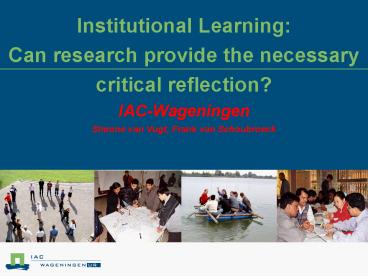Institutional Learning: Can research provide the necessary critical reflection IACWageningen Simone
1 / 17
Title:
Institutional Learning: Can research provide the necessary critical reflection IACWageningen Simone
Description:
Simone van Vugt, Frank van Schoubroeck. Why Institutional Learning? -What are Institutions? ... Causes and effects and costs and benefits separated over space and time ... –
Number of Views:30
Avg rating:3.0/5.0
Title: Institutional Learning: Can research provide the necessary critical reflection IACWageningen Simone
1
Institutional LearningCan research provide the
necessary critical reflection?IAC-WageningenSimo
ne van Vugt, Frank van Schoubroeck
2
Why Institutional Learning?-What are
Institutions?-What is Institutional
Learning?-How can research support
Institutional Learning?
3
Institutional Learning is to address wicked
problems
- Complex interconnected biophysical and social
factors - Uncertain consequences
- Causes and effects and costs and benefits
separated over space and time - Multiple stakeholders at different scales
- Issues are value laden
- Powerful vested interests
- Coordination across political boundaries
- Action is required at multiple scales
4
Between Free Markets and Big Government
Let the Market Rule
Government will solve everyone's problems
Interactive Strategies for Governance
Ideas about complexity, social construction of
knowledge, democratic rights and institutional
transformation
Ideas about the supremacy of science, experts
and technical solutions
Ideas about selfish human nature
Economic (strategic)
Interactive (communicative)
Technical (instrumental)
5
Social / Societal Learning
- Social Learning / Societal Learning facilitated
social (institutional) change based on collective
learning processes, democratic participation and
empowerment
Social / Societal Learning
Organizational / Group Learning
Individual Learning
6
Institutional Learning is critical to
addressWicked Problems
Government
Civil Society
Issue
Private Sector
- Societal goals
- Social equity
- Economic growth
- Environmental sustainability
7
Dealing with the issues requires Institutional
Learning
Institutions are by definition stable entities in
society Our institutions do not change as quick
as developments require Therefore we need to
learn about institutional learning Institutional
change is poorly understood so we need research
support
8
Institutions and Technology
- Many Institutional dilemmas
- Natural resources and market mechanisms
- Equitable property and resource rights
- Legal issues
- Cultural attitudes
- Role of knowledge institutions
- Functioning of public institutions
- Power and influence of the corporate sector
- But
- Modern societies capacity is highly focused
towards technological innovation and development
not institutional innovation - This equals a crisis in governance
9
Process Model for Institutional Change
10
Role of researcher in the Institutional Learning
Process
- The researcher can assume a role in any position
- Obvious research roles overlap with facilitation
roles in the process - Typical researchers roles (where conceptual
understanding is critical)
11
Learning - monitoring and adapting
- Create a learning culture and environment
- Define success criteria (performance questions
and indicators) - Develop and implement monitoring mechanisms
- Review and evaluate progress and identify lessons
- Feed lessons learned back into strategies and
implementation procedures
12
Setting Up
- Clarify the reasons for an MSP
- Undertake initial situation analysis(stakeholders
, issues, institutions, power and politics) - Establish an interim steering body
- Build stakeholder support
- Establish the scope, mandate and stakeholder
expectations - Outline the process, time frame, institutional
requirements and resources needs - Throughout learning monitoring and adapting
13
Planning Strategically
- Build stakeholders understanding of each others
values, motivations, concerns and interests - Generate visions for the future
- Identify issues, problems and opportunities
- Examine future scenarios and feasible options
- Make decisions and agree on key strategies
- Set objectives and identify actions, timeframes
and responsibilities - Document and communicate planning outcomes
14
Implementing Managing
- Develop integrated initiatives and detailed
action plans - Secure resources and technical support
- Develop capacity of stakeholders
- Establish required management structures and
procedures - Manage the implementation process
- Maintain stakeholder commitment
- Identify black cats in the dark
15
Designing an Institutional Learning Process
Paradigm (underlying assumptions
Context Situation Goal / Task
Tool Box Methodologies Methods Tools
Methodology appropriate to your situation and
goal / task
16
The Hawkesbury Cycle
Why - moral, ethical and spiritual
How social change
How complex technology
How simple technology
Why specific phenomena
17
Understanding institutional change requires
research capacity engaged in real-life processes
- To detect black cats in the dark forest
institutional barriers that practitioners
overlook or regard as standard problem
(corruption) - To appreciate institutional learning achievements
by documenting essential, but poorly visible
barriers taken (such as change in values or
administrative procedures) - To test theoretical notions e.g.,
constructivism, and refine them upon exposure to
practice - Researcher in committed or facilitation role































